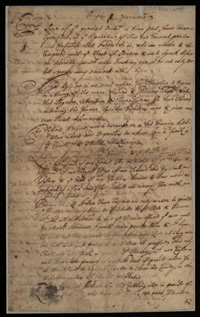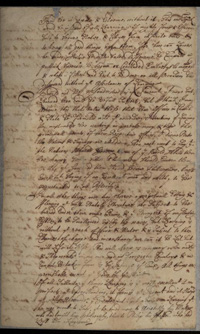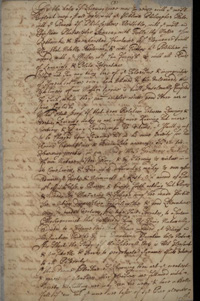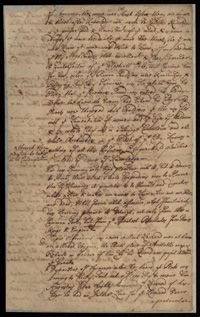MS43.04 Francis Nicholson Papers
First of Five Student Speeches,
[1 May 1699]

Oration I. Vernacular
IF Some of ye. greatest Orators. in time past, have become
Speechless, at ye. Appearance of Some one Eminent person
what Confusion must I needs be in, who am neither to be
Compared with ye. Least of Orators & am to Speak before
an Assembly on wch. when I cast my eyes, I see not only One
but a greate many eminent men.
As God help me tis noe small matter, for a Stripling to Appear
in a throng of Soe many Learned & Judicious Seniors but
that Singular Attention & Cheerefulness Ye have Shewed
in hearing the former Speaker Emboldens mee & gives me
noe Small Assurance.
The Subject Assigned mee to discourse on as best becoming both
ye place where, and ye. persons to whome I am to Speak is
ye. Excell.cy & Utillity of Learning
Let me begg then of yor Excell.cy & ye Honble. Council of State
of ye Comissionrs of our Capitall City & Countys of ye Trustees &
Governors of our Royall College of our Learned and Vigilant—
Pastors & ye. Rest of my Courteous hearers to hear mee—
patiently a few words for I shall not weary You with a—
tedious discourse.
But me thinks I hear Some Say tis an easy matter to praise
ye Muses, an easy thing to Celebrate those Arts & Sciences
whch. by all are owned to bee ye. Scources of all yt we call
Excellent. However I must needs praise them & I hope.
Ye will not bee against it, for when wee Love a thing wee
are both willing to praise it & to hear it praised, And why
Shall wee not Speak in praise of Learning, whch. wee Confide—
will hearafter procure us a greate deal of praise when by
it, Wee shall be rendred Capable to serve our Country, in the
highest dignities of Church & State.
To begin then, if I should say say nothing else in praise of.
Learning but only this that noe Country can ever Flourish &
 And bee in repute & Esteeme, without it. This one Topick
And bee in repute & Esteeme, without it. This one Topick
would be instead of all, Learning is of mighty force & Efficacy
both to Secure States & Cittyes from infinite evils &
to heap all good things upon them, For how can Lawes.
be made, Justice be distributed, difference be Compared—
publick Speeches be begun or Concluded Embassys be managed
& what is fittest and best to be done on all Occasion, bee
discovered without ye Assistance of Learning—
I would not be Misonderstood as if I meant yt none but,
Learned Men could be Usefull Subjects, but I think I may
Advance this that unless those that bear Offices in Church.
& State be furnished with ye. necessary Instructions of Learning
they must needs bee wanting in a greate many & those the.
principall points, of their Respective Offices. O divinie Plato
thy Notions & Sayings are all divine, Thou wast wont to Say
yt the Nations of ye. world should then
bee happy when either Philosophers should Govern them
or they yt Governed them should become Phillosophers. 0 most
Excellent Saying of an Excellent. man and worthy to bee
perpetuated to all Posterity.
In all other things wee may observe a Perpetuall Ebbing &
Flowing ye most stately Structures are Subject to bee
buried under their owne Ruins, & ye Strongest of our floating
Castles, to be Swallowed up. by the waves, but Learning is
without ye reach of fire & Water, and is subject to the
Chances of change and inconstancy nor can it be Lost but
with Life it selfe, This will keep us company when naked.
& shipwraked in our own and in forreigne Countrys &—
Cannot be taken from us by Injurys of Time, All things are
perrishable except ye Goods of ye Mind.
Of all Sublunary things Learning is ye most excellent it—
perfects ye understanding, it formes ye. Judgmt. and it sharpens
ye will Alexander. ye Greate put such a value on Learning yt.
he was wont to say, yt he owed more to Aristotle his Master
who had taught him philosophy, than to Philip his Father who had
Left him a kingdome—

By the help of Learning wee may Converse with ye most
Excelent men of all ages, with ye sublime Philosopher Plato
with ye Prince of Philosophers Aristotle, with ye most—
Christian Philosopher Seneca, with Tully the Master of—
Rethorick, & inexhausted Fountaine of Eloquence, with
Livy that Notable Historian, & with Tacitus: ye Polititian in
aword with ye. Muses, wch. can furnish us with all kinds
of Learning & Polite Literature.
I shall not say any thing here of ye. Solocisms & incongruityes
of Speech wch. are every hour altered by the unlearned; the
Comliness of our Mother tongue is most Intolerably Corupted
by Such, while they can neither write good Sense nor—
true English
What shall I say of that near Relation between Learning &
Virtue, Learning makes us not only more knowing but more
Vertuous: & if any Learned man be vitious, ye Fault is not
to be Charged upon Learning but on his owne pravity for hee
knows better things & Medea Like approoves of 'em too.
Learning excites in our Mindes those Generous Instincts
of our Natures after Glory, & by showing us virtue in—
its Comeliness, & Vice in its deformity, makes us ever after
Admire ye. first, & Abominate ye Last, In aword as a field
wch. of it selfe is Barren & brings forth nothing but Bryars
& woods. by Manuring & Tillage may bee made fertill
soe a vitious dispossition by discipline & good Literature
may be made vertuous, Tis true said Socrates, to a Certain
Physiognomist that upbraided him as being naturally
Addicted to a Certaine vice but I have mended yt vitious—
Inclination said he by my Education— Education helps Nature.
In Short the Study of the Liberall Arts is both pleasant
& profitable & serves to perpetuate ye. names of its votarys
to all Posterity.
O thou divine Pleasure of Learning thou art ye. greatest
& purest of pleasures other pleasures are followed with.
Saciety & Loathing wee may een be weary & have a Belly
full of 'em but ye more wee taste of ye. Pure pleasures—
 Of Learning, the more wee thirst after them, our hunger
Of Learning, the more wee thirst after them, our hunger
& thirst after knowledge can never be Glutted Knowledge
is ye proper food & Nourishmt. of ye mind, & as aman in
a dropsy ye more hee drinks ye more hee thirsts, soe ye more
wee know ye more wee desire to know, If any one doubt
of this Archimedes, that excellent & close Searcher—
& Counterfeiter of ye Celestiall Orbs, will convince him
for hee, when ye. Roman Souldjers were Ransacking &
pillaging his Citty Syracuse, was soe intent upon his
Study that ye Enemies Sword was entred his Body—
before hee knew the Enemy had Entred his Citty The
Streets were thronged with Souldjers ye Air was fil'd
with ye Lamentation of women and ye Cryes of Children
& ye whole Citty was in a Strange Convulsion and all.
while Archimedes, in ye Midst of ye Citty, knowes—
through the—
nothing of all this Confusion,
pleasure he takes
in his Contemplation O unparalle.ld pleasure
O Unheard of desire of Knowledge—
Nor does Learning only bring pleasure with it, but it advances
to Honor; there is not a more Compendious way to Honour—
then by Learning it promotes us to Honours and dignities
while a Live & makes our names to Live when we ourselves
are dead, What favour what affection, what Familiarity
does Learning procure its Votarys, not only from the—
Common Sort, but from ye. Greatest Potentates from Princes
Kings & Emperors—
Scipio Africanus was never without Learned men at home
nor a Broad Stagira, the Birth place of Aristotle was—
Rebuilt in honour of him by his Quondam pupil Alexander.
ye Greate
Dyonisius of Syracuse when he heard yt Plato was
coming to Cicily, Sent out a Flagg Ship to receive him
Augustus Cesar highly honoured ye Learned of his—
Age he had an Intire Love for ye Learned Varro.
a particular